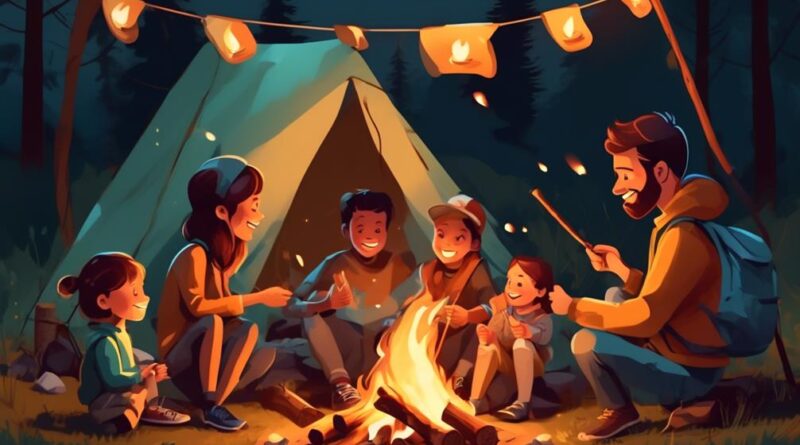Why Is Camping With Young Children Manageable?
So, you've decided to take on the great adventure of camping with young children. You might think it's a daunting task, but fear not!
There are actually several reasons why camping with young children is not only manageable but also a rewarding experience for the whole family.
From safety considerations to embracing the outdoor experience, you'll find that with the right preparation and mindset, camping with little ones can be an enriching and enjoyable experience.
Safety Considerations
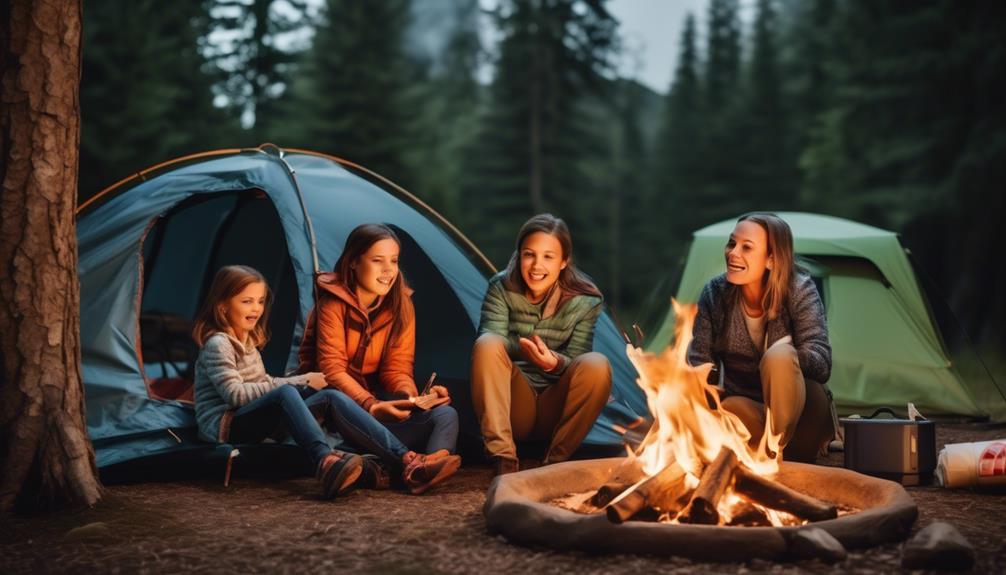
When camping with young children, it's crucial to prioritize safety at all times to ensure an enjoyable and worry-free experience. One of the most important safety considerations is the selection of a suitable campsite. Look for a spot that's away from bodies of water and potential hazards like steep cliffs or rocky terrain. Once you've found a safe location, it's essential to set up your camp properly. Make sure that tents are securely staked down and that campfires are situated in a safe area, away from tents and any overhanging branches.
In addition to the campsite, it's vital to be prepared for emergencies. Pack a well-stocked first-aid kit and ensure that you have access to emergency services if needed. Teach your children about the potential dangers in the wilderness and establish clear guidelines for behavior. Emphasize the importance of staying close and not wandering off alone.
When it comes to activities, always prioritize safety. If hiking, choose trails that are appropriate for young children and ensure that everyone has sturdy footwear. When near water, whether it's a lake, river, or the ocean, ensure that life jackets are worn at all times and that an adult is present and vigilant.
Gear and Equipment Essentials
To ensure a successful camping trip with young children, prioritize packing essential gear and equipment for their safety and comfort. Start with a sturdy and spacious tent that can accommodate your family comfortably. Consider a tent with a separate area for the kids to sleep in, allowing for a bit of privacy and making bedtime routines easier. Sleeping bags designed for children will provide warmth and comfort, and don't forget sleeping pads or air mattresses to cushion the ground.
When it comes to cooking, a portable camping stove or grill is essential for preparing hot meals. Opt for easy-to-cook and kid-friendly food options, and don't forget to pack extra snacks. A collapsible table and camping chairs will make meal times more comfortable for everyone.
For safety, a first aid kit is a must. Make sure it's stocked with essentials like band-aids, antiseptic wipes, and pain relievers. Additionally, a headlamp for each child can provide them with a sense of independence and safety during nighttime bathroom trips.
To keep the kids entertained, pack outdoor toys such as balls, frisbees, and kites. A nature guide or binoculars can also help them engage with the natural environment. Lastly, a portable potty or toilet training seat can be a game-changer for those late-night bathroom runs.
Meal Planning and Preparation
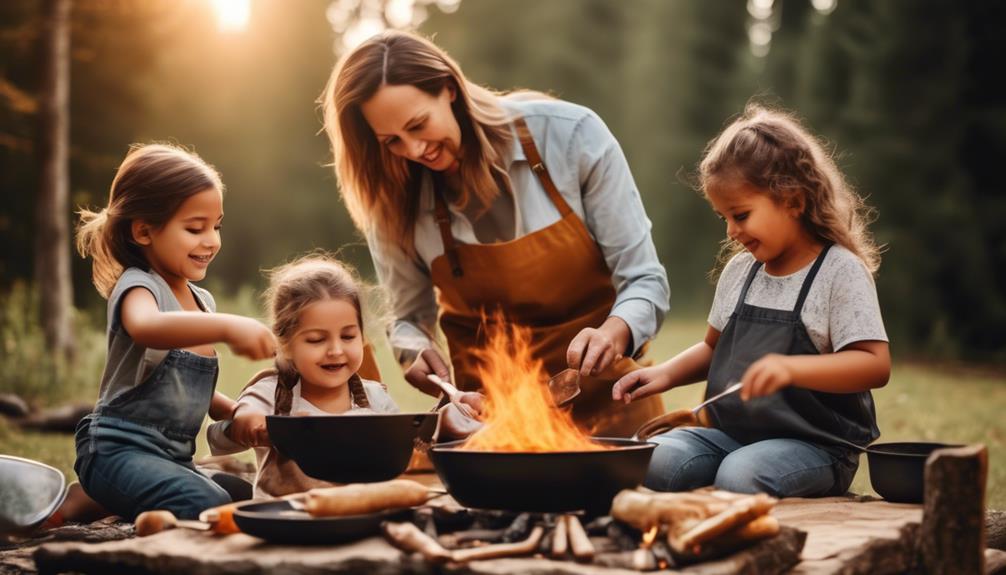
Prioritize efficient meal planning and preparation to ensure a smooth and enjoyable camping experience with young children. When camping with little ones, meal planning is crucial for maintaining their energy levels and ensuring they have enough wholesome food to keep them going throughout the day. One of the best strategies is to plan simple yet nutritious meals that can be prepared with minimal effort. Opt for meals that require fewer ingredients and shorter cooking times. Preparing some food items at home before your trip, such as marinated meats or chopped vegetables, can also save time and effort at the campsite.
Invest in versatile cooking equipment that allows you to prepare a variety of meals. A portable stove with a grill or griddle, for example, can be used to cook breakfast foods, sandwiches, and even simple stir-fries. Additionally, consider using foil packets for cooking. This method not only reduces the need for cleaning but also allows for individualized portions, which can be helpful when catering to children's preferences.
To involve the children in meal preparation, consider easy and fun camping recipes that they can help with, such as assembling their own kebabs or wraps. This not only keeps them engaged but also encourages them to try new foods. Furthermore, having a designated area for snacks and easy-to-access food items can help prevent meltdowns and keep hunger pangs at bay.
Activities for Entertainment
Consider incorporating interactive games and creative projects to keep young children entertained during your camping trip. Keeping kids engaged and entertained is crucial to ensuring a successful and enjoyable camping experience for the whole family. Here are some activity ideas to consider:
- Scavenger Hunt: Organize a nature-themed scavenger hunt around the campsite. Provide children with a list of items to find, such as pinecones, specific leaves, or different types of rocks. This activity not only keeps them entertained but also encourages them to explore and appreciate the natural surroundings.
- Campfire Stories: Gather around the campfire and take turns telling stories. Encourage children to use their imagination and creativity to come up with their own tales. This activity not only provides entertainment but also helps create lasting memories.
- Nature Crafts: Engage children in nature-inspired arts and crafts projects. Collect leaves, flowers, and twigs to create beautiful nature collages or use them to make leaf rubbings. This allows children to express their creativity while connecting with the natural environment.
- Outdoor Games: Plan a variety of outdoor games such as relay races, potato sack races, or capture the flag. These games promote physical activity and friendly competition, keeping children active and entertained.
Sleep Setup and Arrangements
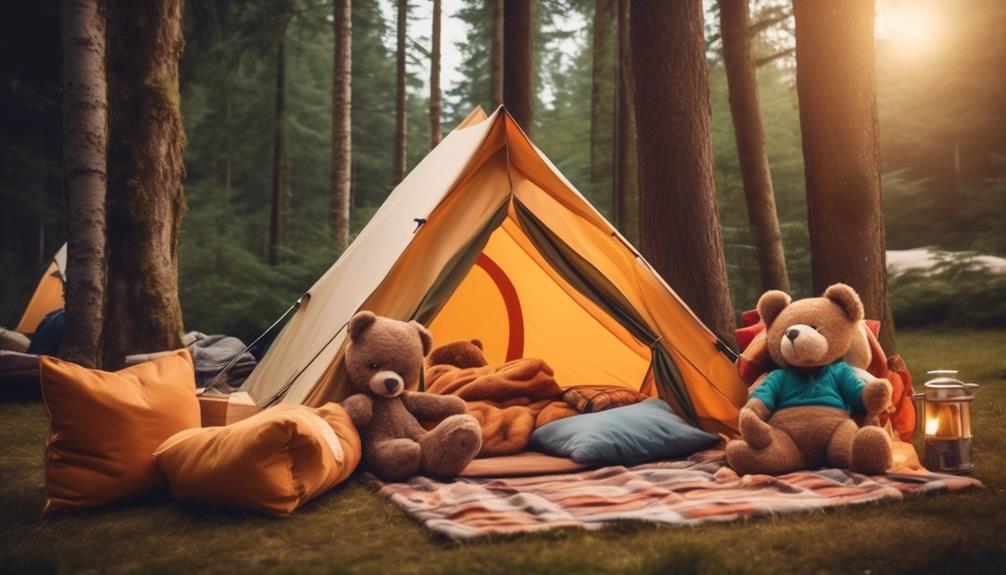
Setting up your sleep arrangements efficiently can make a significant difference in ensuring a comfortable and restful camping experience for your family. When camping with young children, it's essential to plan and organize your sleep setup to accommodate everyone's needs.
One of the most common sleeping arrangements is using a spacious family tent. This allows you to create separate sleeping areas for adults and children, providing a sense of security and comfort for everyone. Additionally, investing in high-quality sleeping pads or air mattresses can greatly improve the quality of sleep for both you and your children.
Another crucial aspect of sleep setup is ensuring that everyone stays warm throughout the night. Packing appropriate sleeping bags rated for the expected temperatures is vital. For younger children, consider using sleeping bag liners or extra blankets to provide additional warmth. It's also important to check the weather forecast and be prepared for any unexpected changes in temperature.
Moreover, creating a bedtime routine can help children feel more at ease in the camping environment. Familiar activities such as reading a bedtime story or having a calming bedtime snack can signal to children that it's time to wind down and get ready for sleep. Additionally, using dim lights or lanterns can create a cozy atmosphere inside the tent, aiding in the relaxation process.
Hygiene and Sanitation Practices
To maintain cleanliness and prevent the spread of germs while camping with young children, it's important to establish a practical and effective hygiene and sanitation routine. Here are some essential tips to ensure that hygiene and sanitation practices are manageable while camping with young children:
- Hand Hygiene: Encourage regular handwashing with soap and water, especially before meals and after using the restroom. Hand sanitizers can be a convenient alternative when water isn't readily available.
- Waste Disposal: Properly dispose of all waste, including food scraps and diapers, in designated trash receptacles. Consider using biodegradable or compostable products to minimize environmental impact.
- Personal Care Items: Pack essential personal care items such as toothbrushes, toothpaste, and wet wipes. Keep these items easily accessible for regular use.
- Campsite Cleanup: Establish a routine for tidying up the campsite, including clearing away any food remnants, organizing personal items, and maintaining a clean and clutter-free environment.
Setting Realistic Expectations
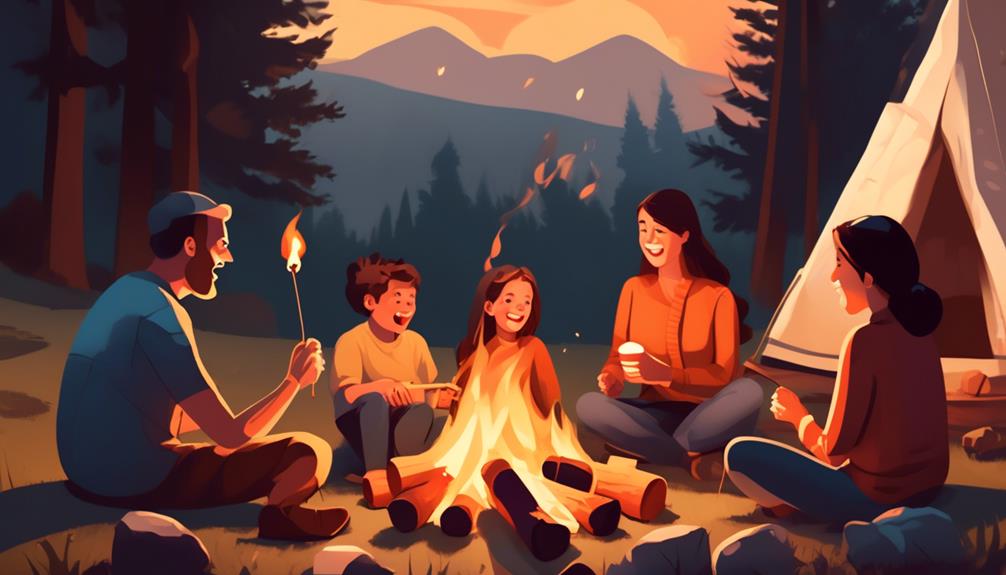
When planning a camping trip with young children, it's important to establish realistic expectations to ensure a smooth and enjoyable experience for everyone involved.
Setting realistic expectations starts with understanding the limitations and capabilities of young children. While it's natural to desire an adventurous and activity-filled trip, it's crucial to acknowledge that young children may not have the same stamina or enthusiasm for long hikes or strenuous activities. Instead, focus on shorter, more manageable activities that align with their energy levels and attention spans.
Additionally, it's essential to be prepared for unpredictable behavior and emotions. Young children may feel overwhelmed by the new environment and the change in routine, leading to tantrums or resistance. By expecting these behaviors and having a plan in place to address them, you can navigate through these moments more effectively.
Another aspect of setting realistic expectations involves the accommodations and amenities. While camping typically involves embracing a simpler way of living, it's important to ensure that basic needs are met. Realistically assess the sleeping arrangements, meal options, and access to facilities. By doing so, you can avoid unnecessary discomfort and frustration.
Lastly, it's crucial to acknowledge that not everything will go according to plan. Weather changes, unexpected challenges, and unforeseen circumstances are all part of the camping experience. By mentally preparing for these possibilities, you can approach them with a more flexible and adaptable mindset, ultimately leading to a more enjoyable experience for both you and your young children.
Embracing the Outdoor Experience
Embrace the outdoor experience by encouraging your young children to explore nature and engage in hands-on activities that foster their curiosity and appreciation for the natural world. There are countless benefits to embracing the outdoor experience and allowing your children to connect with nature. Here's how you can do it:
- Nature Walks: Take leisurely strolls through the campground or nearby trails. Encourage your children to observe the different plants, trees, and wildlife they encounter. Point out interesting features and ask them questions about what they see.
- Nature Scavenger Hunt: Create a fun scavenger hunt by making a list of things for your children to find in nature, such as a unique leaf, a smooth rock, or a certain type of flower. This activity will keep them engaged and excited about exploring the outdoors.
- Campfire Stories: Gather around the campfire and share stories about the natural world. Encourage your children to contribute their own tales, fostering their creativity and imagination.
- Stargazing: On a clear night, lay out a blanket and spend time looking up at the stars. Teach your children about the different constellations and encourage them to ask questions about the universe.
Engaging in these activities won't only create lasting memories but also instill a love and respect for the outdoors in your young children.
Frequently Asked Questions
How Can I Keep My Young Children Entertained and Engaged During the Camping Trip?
To keep your young children entertained and engaged during the camping trip, bring along outdoor games, nature scavenger hunts, and storytelling around the campfire. Encourage them to explore and interact with the natural environment.
Are There Any Specific Safety Tips for Camping With Young Children Near Bodies of Water?
When camping with young children near bodies of water, always supervise them closely. Teach them water safety, like wearing life jackets and not going near water without an adult. Set clear boundaries to ensure their safety.
What Should I Do if My Child Gets Sick or Injured While Camping?
If your child gets sick or injured while camping, assess the situation calmly and provide first aid as needed. If the situation is severe, seek medical help immediately. Always have a well-stocked first aid kit on hand.
How Can I Ensure My Young Children Get Enough Rest and Sleep While Camping?
To ensure your young children get enough rest and sleep while camping, set up a consistent bedtime routine, bring familiar bedding, and limit sugar and caffeine intake. Stick to regular nap and bedtime schedules to support their sleep.
What Are Some Strategies for Managing Tantrums and Meltdowns While Camping With Young Children?
When camping with young children, try to maintain consistent routines and bring familiar comfort items. Stay calm during tantrums, validate their feelings, and offer distraction or a change of scenery. Remember, it's okay to take a break if needed.
Conclusion
So, don't be afraid to take your young children camping. With the right preparation, gear, and mindset, it's manageable and can be a wonderful experience for the whole family.
Remember to prioritize safety, plan meals and activities, and embrace the outdoor experience. With a little patience and flexibility, you can create lasting memories and instill a love for nature in your children.
Happy camping!
